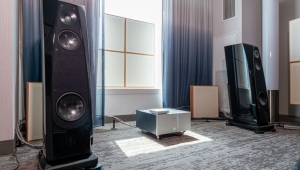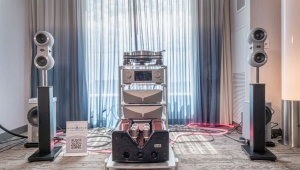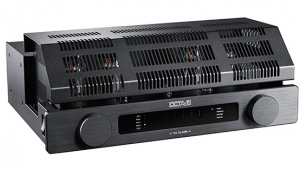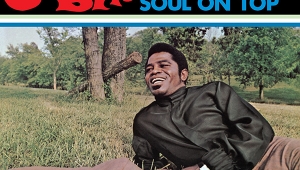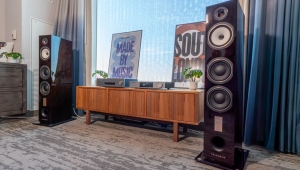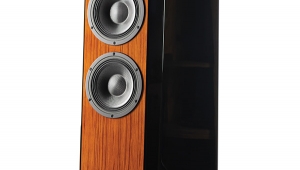| Columns Retired Columns & Blogs |
J. Gordon Holt, 1930–2009
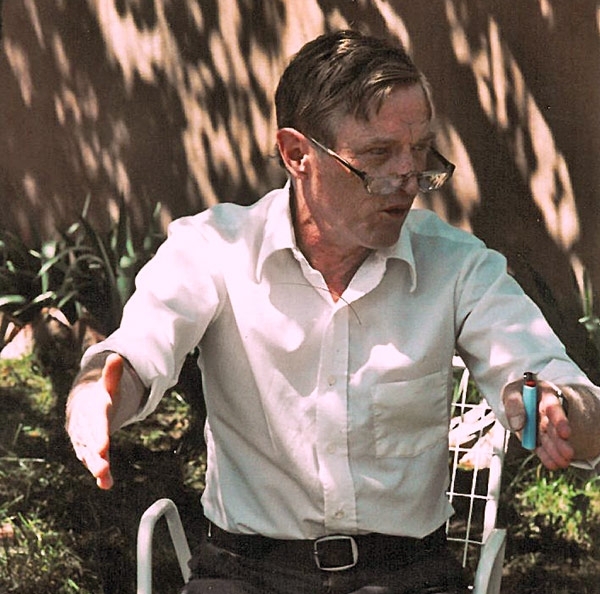
"What about coming over for a little bit of din-din?"
That's how my long, peculiar relationship with J. Gordon Holt began, back in 1978. Born on April 19, 1930, Gordon died Monday July 20, 2009 after a long struggle with emphysema. He leaves behind his son Charles and daughter Alicia, both featured in old issues of Stereophile, his great Colorado friends Bob O'Neill and Steven Stone, both former Stereophile contributors, and legions of grieving audiophiles. We are all struck down by his passing.
Gordon had moved to Santa Fe that year and was yearning for audiophile companionship (perhaps) and manual labor (for sure). He'd heard about me from Alan Hill, the Albuquerque-based inventor of the Plasmatronics loudspeaker, with its virtually massless out-to-100kHz-with-no-resonances high-frequency driver.
I was a hi-fi enthusiast turned auto mechanic. In the beginning, there was nothing peculiar about my relationship with Gordon. He was the Great Man of Audio—although, somewhat peculiarly, I knew almost nothing of him from Stereophile, which was damned hard to find in New Mexico. But he was featured regularly in the pages of The Abso!ute Sound, who revered him almost as much as did the readers of the magazine that he founded.
Gordon would invite me over, and we'd listen, or I'd move some enormous amplifiers around—there were positives to my background as an auto mechanic. We'd tweak, then we'd listen, then we'd discuss philosophical issues, and maybe have a drink.
As Charles Holt (Gordon's son) mentions on the Stereophile website and in this issue's Letters on p.11, Gordon was a great one for a martini, and a true bon vivant—or, at least, as bon vivant as a true curmudgeon can be.
Gordon was not a simple man. He loved people, including me and many people of approximately my age, yet could write about baby boomers as being "the most spoiled, destructive generation of irresponsible brats the world has ever seen." He loved to rile people up in print, but didn't particularly like knock-down-drag-outs in person—much better to go out for a drink and a nice steak dinner.
Gordon relished writing negative reviews more than any audio writer I know. At one Consumer Electronics Show, he wrote up a loudspeaker designed for outdoor use whose manufacturer had unwisely set it up with little fountain jets raining on it. Gordon's comment was that the fountains were substituting for the audio-quality–minded reviewers who, given their druthers, would be urinating on the product.
Then there was his review of the Koss Pro-X4C headphone, which contained the comment that the "X" in the model name must stand for "execrable." Needless to say, that kept me from wasting any time soliciting advertising from Koss, though they were probably a lost cause no matter what.
Yet, in person with manufacturers, Gordon was the soul of sociability. He was affable and familiar, had lots of friends in the industry, and just loved to sit around and talk—about families, business, product design, you name it.
Probably that was at the heart of our peculiar relationship. He had truly struggled for 20 years to keep Stereophile in business. With announced publication schedules of four, eight, or ten issues per year, he averaged 2.3. His faithful wife, Polly, sold her family jewelry in order to get issues out. (She also maintained the subscriber database, such as it was, and ran the music-review section—Polly was a very bright person.) Regular publication was a curse on Gordon, and running a business was the opposite of natural.
So, ostensibly, my purchase of the magazine in 1982, with the promise of a regular paycheck yielding Gordon a better-than-living wage, and relief from the day-to-day doldrums of business (little did I know what I was letting myself in for), should have been a godsend for him. At the same time, I had taken Gordon's magazine away from him, leaving, eventually, a bitterness that was all too evident in his interview with John Atkinson in the November 2007 issue.
That didn't happen right away. There was a long period of intense productivity, with Gordon writing much of what appeared in the 10 issues of Stereophile we were able to crank out every year in those early days. But with that extra writing came a feeling of his nose being put to the grindstone, as well as the loss of editorial control that comes when a magazine expands its horizons—as we necessarily did, in order to expand from the 3000 subscribers who had stuck with the magazine until 1982.
Eventually, JGH had to branch out, into LaserNews and Videofax. These satisfied his iconoclastic need to pronounce, denounce, and generally have his own way, but they brought with them the same day-to-day publishing trauma he'd just escaped at Stereophile. In the end, there was no completely satisfactory solution.
Nevertheless, Gordon's legacy is staggering. In the 46 issues of Stereophile he created on his own, and in the large legacy he contributed thereafter, you see the work of an entirely original man. Fearless in his opinions, groundbreaking in his endeavors—in the US at least, he founded subjective hi-fi reviewing, thus inventing an entire field and almost an industry—willing to be wrong, and willing to contradict himself.
I feel bad about the bitterness I heard from him, particularly in the last 10–12 years since he resigned from the magazine he founded, but I have cherished, and will continue to cherish, the great times, the originality of who he was, and the extraordinarily special love he had for the blat of a live trombone and the shriek of massed strings—"palms in the eyesockets schmaltz," in a phrase he coined during a review of Tchaikovsky's Sixth.
Palms-in-the-eye-sockets sorrow is appropriate at this moment. That, and proper appreciation of a good martini. For those who never met Gordon, the images posted on the Stereophile website do a great job of describing his many sides. How he might be when you would run into him: the picture of him standing next to his full-size effigy. How he frequently felt about the world in general: the button of Gordon giving everyone the finger. How he felt about the world of commerce: his slogan (also made into a button) "the better the ad, the worse the product."
But the image that best captures who Gordon really was—the photo on the cover of the Winter(4), 1973/74 issue of Stereophile—was of an intense, committed man doing one of the things he loved best: making a recording. That's the man who could really make some things happen.—Larry Archibald
- Log in or register to post comments

















